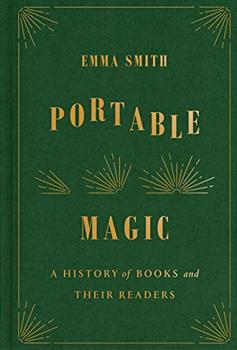Summary | Excerpt | Reviews | Beyond the Book | Readalikes | Genres & Themes | Author Bio

 Book Reviewed by:
Book Reviewed by:
Tasneem Pocketwala
Buy This Book
Introduction:
Magic books
There was once a very learned man in the north-country who knew all the languages under the sun, and who was acquainted with all the mysteries of creation. He had one big book bound in black calf and clasped with iron, and with iron corners, and chained to a table which was made fast to the floor; and when he read out of this book, he unlocked it with an iron key, and none but he read from it, for it contained all the secrets of the spiritual world.
This is the opening to the folktale "The Master and His Pupil," first printed in English at the end of the nineteenth century but circulating long before. Even though you probably haven't read it, it may well seem familiar (that's pretty much the definition of a folktale). And when you read the start of the next paragraph— "Now the master had a pupil who was but a foolish lad"— it is probably clear already what will happen. This is a version of the sorcerer's apprentice tale, and the pupil will take his place in a line of hapless book handlers from Victor Frankenstein to Harry Potter. Like them, he will stumble into read aloud inadvertently from, or otherwise mishandle this magic book, with terrible consequences.
Sure enough, the boy opens the book, which has been left unlocked by the master. As he reads from its red- and- black printed pages, there is a clap of thunder. The room darkens. Before him there appears "a horrible, horrible form, breathing fi re and with eyes like burning lamps. It was the demon Beelzebub, whom he had called up to serve him." Asked by this terrifying apparition to set him to a task, the pupil panics. In a strangely domestic moment, he asks the demon to water a potted geranium. The demon complies, but he repeats the action over and over, until the house is awash, "and would have drowned all Yorkshire." The master returns in the nick of time, to speak the countercharm that sends the demon back into the pages of the book.
In the massive compendium of folklore motifs compiled by the American folklorist Stith Thompson in the early twentieth century, this story type is traced across various European languages. Categorized as D, "Magic": subsection 1421.1.3: "magic book summons genie," its exemplars across many centuries range from Icelandic to Lithuanian traditions. Each of these iterations shares an outline. A magical or powerful book is kept under the control of a learned man— a minister, magician, or scholar. While he is temporarily absent, some unskilled person in his household— a child, servant, or friend— finds the book and accidentally summons a devil.
The story captures a widespread fear that books are powerful and dangerous in the wrong hands. What makes the master the master, and the pupil the pupil, is their ept or inept use of the book: it is the object that secures their relative positions. It is an active agent of social differentiation, conferring status upon its handler. This is absolutely not a parable of books as democratic objects, available to all. Once the pupil can manipulate the book of knowledge effectively, he will become the master. But this is exactly what makes the book a potential disruptor of social hierarchies.
Anxieties about books' disruptive power had begun to intensify in the sixteenth century: in one early version of the story, performed for a culture newly enamored of the products of mechanical printing, an intellectually restless scholar uses them as go- betweens in his conversation with devils, swapping infernal knowledge for an immortal soul. In this, Christopher Marlowe's Doctor Faustus departed from its predecessors in German folk-lore: the original Faustian pact traded directly with the devil. But Marlowe was speaking to the Renaissance world of knowledge created by the printing press, which had made books more present, more prevalent, and more liable to fall into the wrong hands (that Faust, or Fust, was also the name of Johannes Gutenberg's business partner in his print shop may be a coincidence, but it is a delicious one).
Excerpted from Portable Magic by Emma Smith. Copyright © 2022 by Emma Smith. Excerpted by permission of Knopf. All rights reserved. No part of this excerpt may be reproduced or reprinted without permission in writing from the publisher.





The Funeral Cryer by Wenyan Lu
Debut novelist Wenyan Lu brings us this witty yet profound story about one woman's midlife reawakening in contemporary rural China.
Your guide toexceptional books
BookBrowse seeks out and recommends the best in contemporary fiction and nonfiction—books that not only engage and entertain but also deepen our understanding of ourselves and the world around us.